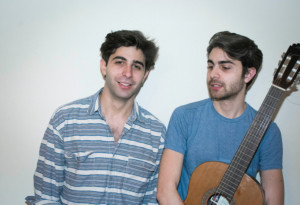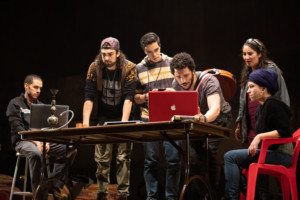Interview: Patrick And Daniel Laazour of WE LIVE IN CAIRO at American Repertory Theatre

We Live in Cairo just finished a successful run at American Repertory Theatre (A.R.T.) in Cambridge. The musical was inspired by the young Egyptians who took to the streets in 2011 to overthrow President Hosni Mubarak, this world premiere musical follows six revolutionary students armed with laptops and cameras, guitars and spray cans as they come of age in contemporary Cairo. Winner of the Richard Rodgers Award for Musical Theater, We Live in Cairo moves from the jubilation of Tahrir Square through the tumultuous years that followed. As escalating division and violence lead to a military crackdown, the revolutionaries of Tahrir must confront the question of how-or even whether-to keep their dreams of change alive.
BroadwayWorld sat down with Daniel and Patrick recently about their journey to get this musical produced.
How did you get into writing musicals?
Patrick: We had a competition at our high school, when I was 15 and Daniel was 13, to write a fifteen-minute musical and that was the start. After that there was a community theatre near us in Boylston, MA called Calliope Theatre and every summer for three years we were given space to write and produce a new musical for the community. We experimented and learned as we went along - it very much served as our "musical theatre" education.
Do you have a formal background in theatre?
Patrick: I attended Boston College as a theatre and political science major.
Daniel: I attended Columbia University as a Music Major, and I also took music theory classes, and piano classes at Berklee.
Did you either of you act or sing?
Patrick: We sing. Acting not as much. We spent most of our time honing our songwriting.
Daniel: We perform our own songs together at bars and clubs, to keep the creative process alive between musical creation.
Do you split duties? i.e. one writes music, and one writes the lyrics?
Daniel: Patrick writes more lyrics and I write more music when we start a show, but through the process - as we refine the musical - we both work on all aspects together, usually in the same room.
What led you to want to write a musical about the student led ouster of President Hosni Mubarak?
Patrick: I was in a class about political revolution at Boston College and the professor showed us the photo by New York Times reporter Ed Ou, depicting a group of Egyptian students all looking intently at a laptop during the uprising. I thought of our generation, and the power of social media to force change. Daniel and I are of Lebanese descent, and their story just really resonated with us. It is also is a living, breathing event of our time, not just an event from the past. Egypt went from the thirty-year reign of Hosni Mubarak, to his sudden overthrow, to control by the Muslim Brotherhood, and right on to another corrupt regime (currently in power.) Things in Egypt are still evolving daily, for instance, with the recent death of Mohamed Morsi.
I thought of our generation, and the power of social media to force change. Daniel and I are of Lebanese descent, and their story just really resonated with us. It is also is a living, breathing event of our time, not just an event from the past. Egypt went from the thirty-year reign of Hosni Mubarak, to his sudden overthrow, to control by the Muslim Brotherhood, and right on to another corrupt regime (currently in power.) Things in Egypt are still evolving daily, for instance, with the recent death of Mohamed Morsi.
How did you get the Musical produced by A.R.T.?
Patrick: In 2016, we won the Richard Rodgers award for this Musical and it allowed us to have New York Theatre Workshop host a staged reading in New York. Mark Lunsford, Artistic Producer at A.R.T., saw the reading and was excited by the possibilities of a full production. He also saw how this production could align with A.R.T.'s mission, and with the greater Harvard community, and he invited us to come to A.R.T. and read from the script and perform some songs for Diane Borger, Executive Producer at ART.
Daniel: It seemed so unreal, we hoped we might one day get a production produced, but never at a prestigious theatre like A.R.T., especially at this stage in our careers. Once they agreed to produce our Musical, they introduced us to Professor Tarek Masoud, and others at Harvard, who helped us with context and accuracy. With our wonderful Director Taibi Magar, who has expertly guided this production throughout the process, we traveled to Egypt and work-shopped the production further with students at American University in Cairo.
Now that the production has concluded, what are some of your thoughts, about what you two have learned through the process that you want to share?
Patrick: I think that we still want to work on the script, as it is always a process with these things. We had a woman from the audience tell us, at a "talk back" after a performance, that we need to convey more strongly that this movement is still ongoing in Egypt, and there is still a corrupt group in power and we need to help Americans understand that it is not a finished moment in history. We need to make sure that the show feels ever-immediate, urgent - and reveal that the narrative is not finished, but ongoing.
Daniel: We are proud that the Musical features eight actors of middle eastern descent, who all bring their own unique perspectives and stories to their portrayal of the characters that we created.
What is next for We Live in Cairo?
Patrick: There is always more work to do, so we will continue to look at scenes and songs to make the narrative better, more effective, and we hope there are more opportunities for more people to see the piece in the future.
It is great to see you exploring a social justice theme as a musical, in this work. Are you working on another Musical?
Patrick: Actually, we are working on a musical about cancer research in the United States.
Comments

Videos

